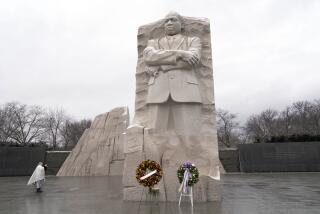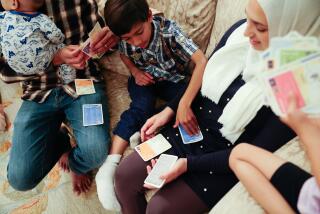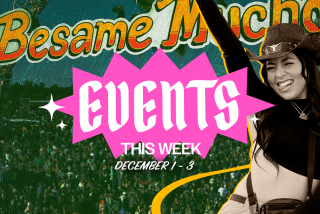Kwanzaa Week Celebrates Rich Black Heritage
- Share via
Today is Kwanzaa, the beginning of a special seven-day holiday for many black families who wish to celebrate their African-American culture and heritage.
In Los Angeles, the Kwanzaa festivities start at 11 a.m. with a Gwaride (pronounced Gwa-Ree-Dey), a traditional procession, from the corner of Crenshaw and Exposition boulevards. Paraders will march south on Crenshaw 1 1/2 miles to Leimert Park for a daylong festival, featuring African music, food, clothing and arts and crafts.
“It is for us to express who we are, if we don’t do that at any other time of the year,” said Akile, director of the Kwanzaa People of Color organization, which is coordinating several events for the holiday (it runs through Jan. 1). “Kwanzaa gives us the opportunity to express ourselves and our culture, wear our traditional clothes, sing our songs and dance our dances.”
Akile, who has worked on Kwanzaa events since 1975, said the theme of this year’s event is “Our Cultural Legacy.” Similar large Kwanzaa celebrations are held each year in New York and Chicago.
Kwanzaa was conceived 22 years ago in Los Angeles by black activist Maulana Karenga, who teaches at Southwest University and founded the Afro-American Cultural Center, a black cultural group at 2560 West 54th St. The word comes from kwanza , a Swahili word meaning “first,” and is used, as Karenga suggested, in the phrase matunda ya kwanza , which means “first fruits.”
This year, Kwanzaa organizers estimate that more than 200,000 blacks will participate in Kwanzaa activities in Los Angeles, about 10 million nationwide.
“I have seen Kwanzaa grow from few to many,” Akile continued. “We started with about 20 people and now there are thousands.”
He explained that Dec. 26, the day of Umoja (Oo-moe-jah), meaning Unity, is not only the first day of Kwanzaa, but the first day of the Kwanzaa New Year, which also happens to be the Year of Umoja in 1988.
Lasts Seven Days
As set up by Karenga, there are seven principles to the Kwanzaa celebration: Each day marks a separate theme, as does each year. Following Umoja is Kujichagulia (self-determination), Ujima (collective work and responsibility), Ujamaa (cooperative economics), Nia (purpose), Kuumba (creativity) and Imani (faith).
In keeping with the cultural theme of the Kwanzaa parade, many entrants in the parade will portray folk characters, such as Br’er Rabbit, Br’er Fox and Br’er Bear; others will dress as personalities of importance to the growth and development of African-Americans, among them Harriet Tubman, Martin Luther King Jr., Marcus Garvey, W.E.B. Dubois, Elijah Muhammad and Malcolm X.
This is the first year that members of black student organizations from various local colleges will enter floats in the procession. There will also be marching bands, drill teams, drum corps, youth groups and car clubs, and organizers expect many local black celebrities to attend.
Many Events Scheduled
Also today and Sunday at 3:30 p.m., the Los Angeles Children’s Museum at 310 N. Main St. will celebrate Kwanzaa with events for children. Special altars will be set up in the museum’s workshop place; the altars feature woven mats (mkekas) and candelabras (kinara) that hold the seven Kwanzaa candles--three green, three red and one black. Children will make unity cups and have juice and toast.
Before the 3:30 events both days, musician Andre Ray will entertain children with Kwanzaa music and dance at noon and 2 p.m.
Other events planned include a gospel showcase Sunday, and a jazz caravan, featuring musicians from the local community, for Monday. Both events will begin at 11 a.m. at Leimert Park at the corner of Crenshaw Boulevard and Vernon Avenue.
Family Celebrations
During the week, many black families will celebrate the rest of the Kwanzaa days with family observances, private dinners and giving of gifts to the children.
For details on the week of events, there is a Kwanzaa hotline number: 856-6231.
“The zawade (gifts) given to our children are a reward for completing a task,” Akile said. “We try to put into the children’s mind to take responsibility for doing a task. The gift is a reward they’ve earned.”
A children’s karamu , an African feast, is being held today at the Afro-American Cultural Center from noon to 2:30 p.m., but the traditional Kwanzaa family karamus are celebrated on New Year’s Eve, Dec. 31.
One karamu is planned at 6:30 p.m. at Southwest College, 1600 W. Imperial Highway, by the Afro-American Cultural Center, (213) 299-6124. Another is scheduled at 8 p.m. at Omowale Ujamaa School, 1415 N. Raymond Ave., Pasadena.
During the coming year, Akile explained, Kwanzaa People of Color plans several programs and activities, among them a Gwaride awards banquet, the development of an information center, an art/film/music festival, an African Village Faire and a masquerade. The telephone number for Kwanzaa People of Color is (213) 751-0122.


